
Last updated: 30 ส.ค. 2565 | 2805 จำนวนผู้เข้าชม |

ผลลัพธ์อาจแตกต่างกันไป แล้วแต่บุคคล
ผลลัพธ์อาจแตกต่างกันไป แล้วแต่บุคคล
ผลลัพธ์อาจแตกต่างกันไป แล้วแต่บุคคล
ผลลัพธ์อาจแตกต่างกันไป แล้วแต่บุคคล
ผลลัพธ์อาจแตกต่างกันไป แล้วแต่บุคคล
รอยสักจากอุบัติเหตุ (Traumatic Tattoos) มีลักษณะอย่างไร & ดูแลอย่างไร?
https://youtu.be/OYrE2zJUKNQ
รอยสักจากอุบัติเหตุ (Traumatic Tattoos)
•เกิดจากการฝังตัว ของฝุ่น สิ่งสกปรก ใต้ผิวหนัง กรวด, ยางมะตอย, สิ่งสกปรก, ฝุ่น, ไส้ดินสอ, โลหะ, ดินปืน, และเศษดอกไม้ไฟ, ทำให้เกิดเป็นรอยดำๆ หลังจากผิวหนังบริเวณนั้นหาย พบได้บ่อยจากอุบัติเหตุรถจักรยาน หรือรถจักรยานยนต์ หรือเกิดจาก ดินสอดำทิ่ม หรือเจาะ (graphite or pencil-point tattoo)
•นอกจากนี้อาจเกิดจากโดนเศษกระสุนปืน เศษพลุ ซึ่งมีคาร์บอนหรือเม็ดสีอย่างอื่นฝังเข้าไปในผิว ซึ่งเม็ดสีจากการสักแบบนี้ มักจะฝังลงไปในผิวชั้นลึก ทำให้การลบรอยสักทำได้ยาก นอกจากนี้เม็ดสีจากวัสดุเหล่านี้ อาจไม่ตอบสนองต่อการลบด้วยเลเซอร์
สีของรอยสักจากอุบัติเหตุ จะแตกต่างกันไปจากสีดำ สีเทา สีน้ำเงินถึงสีน้ำตาล ขึ้นอยู่กับวัสดุและความลึกของรอยสัก ในกรณีส่วนใหญ่ ส่วนประกอบคาร์บอนทำให้เกิดสีน้ำเงินดำ
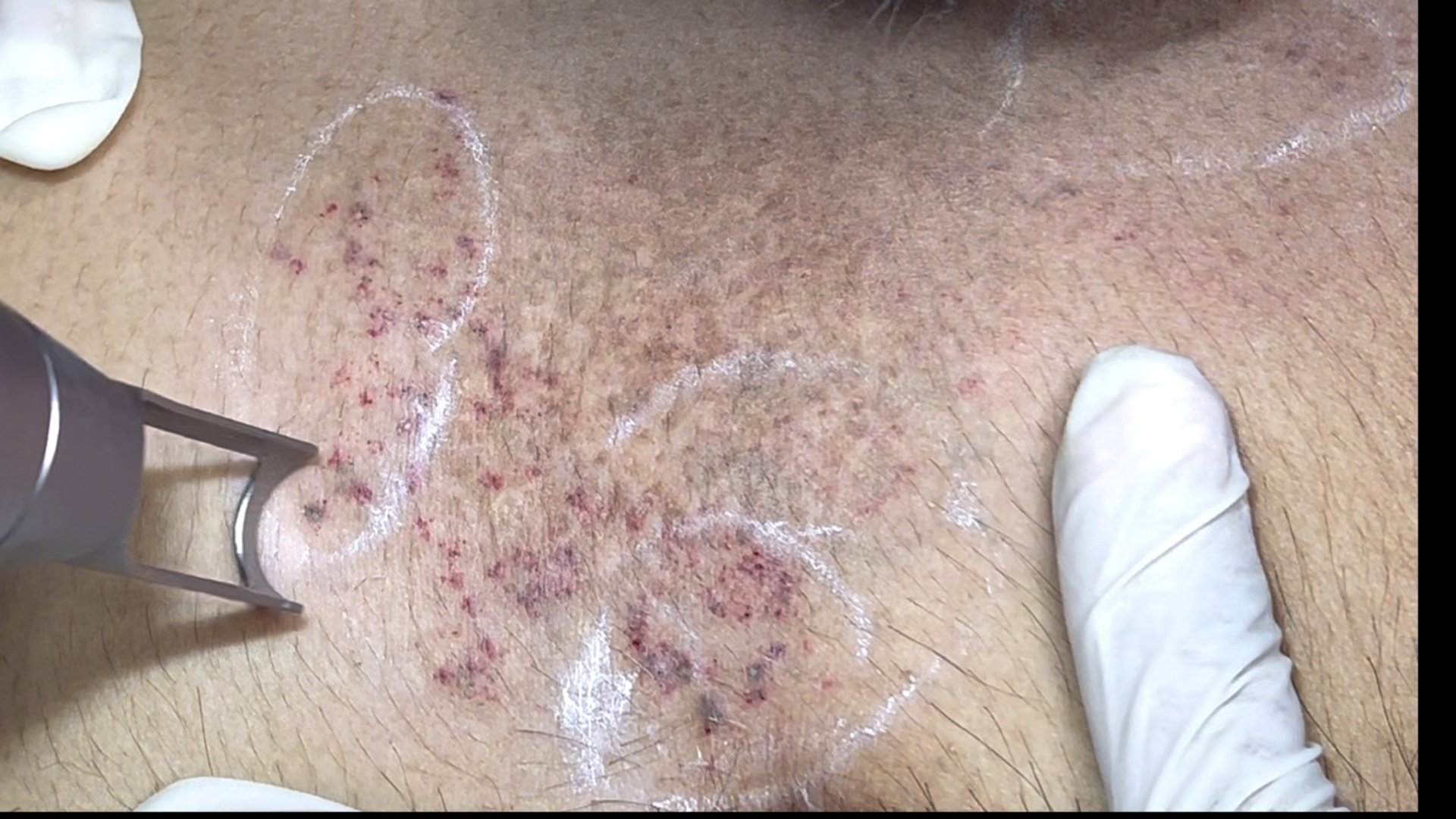
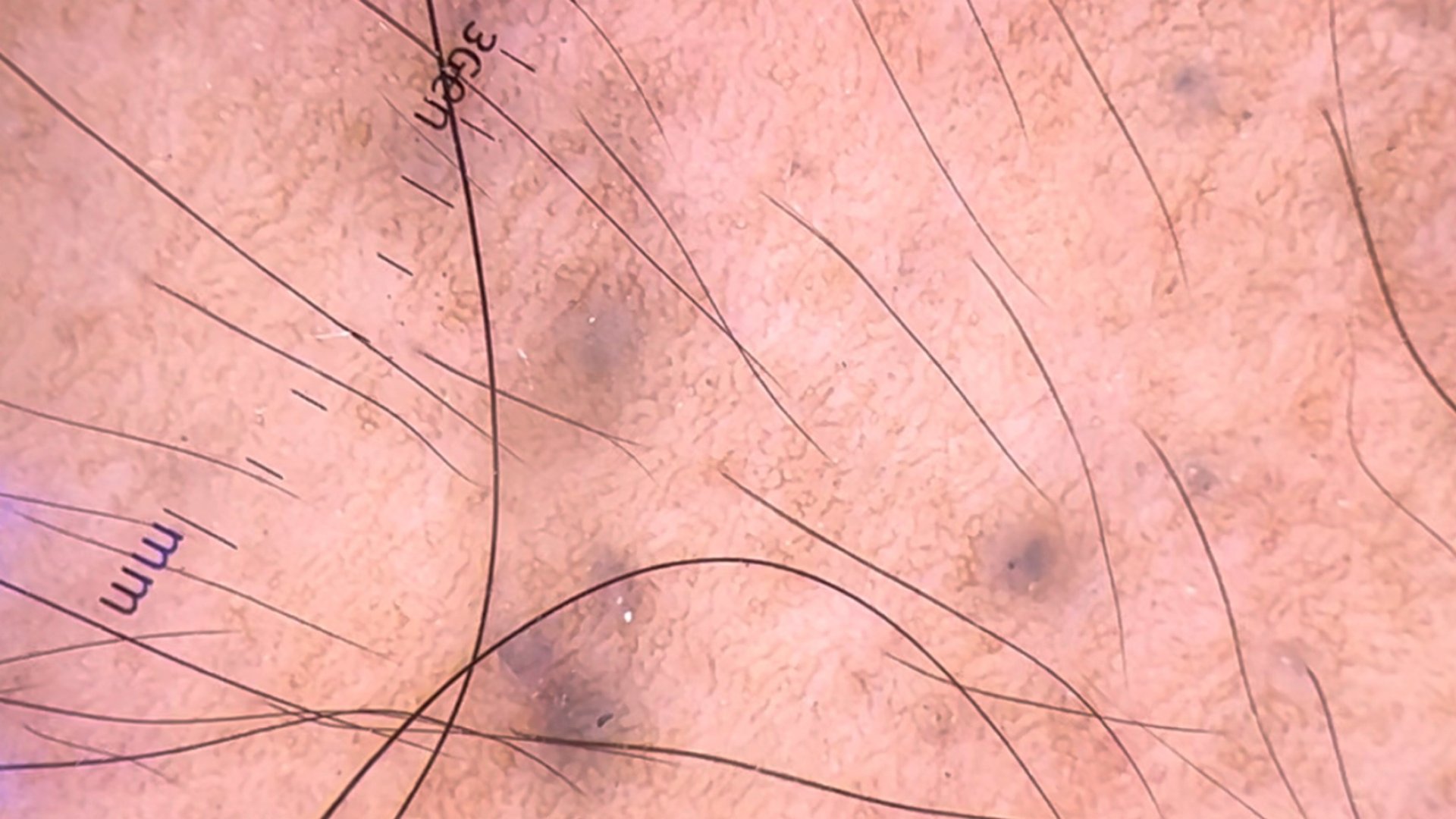
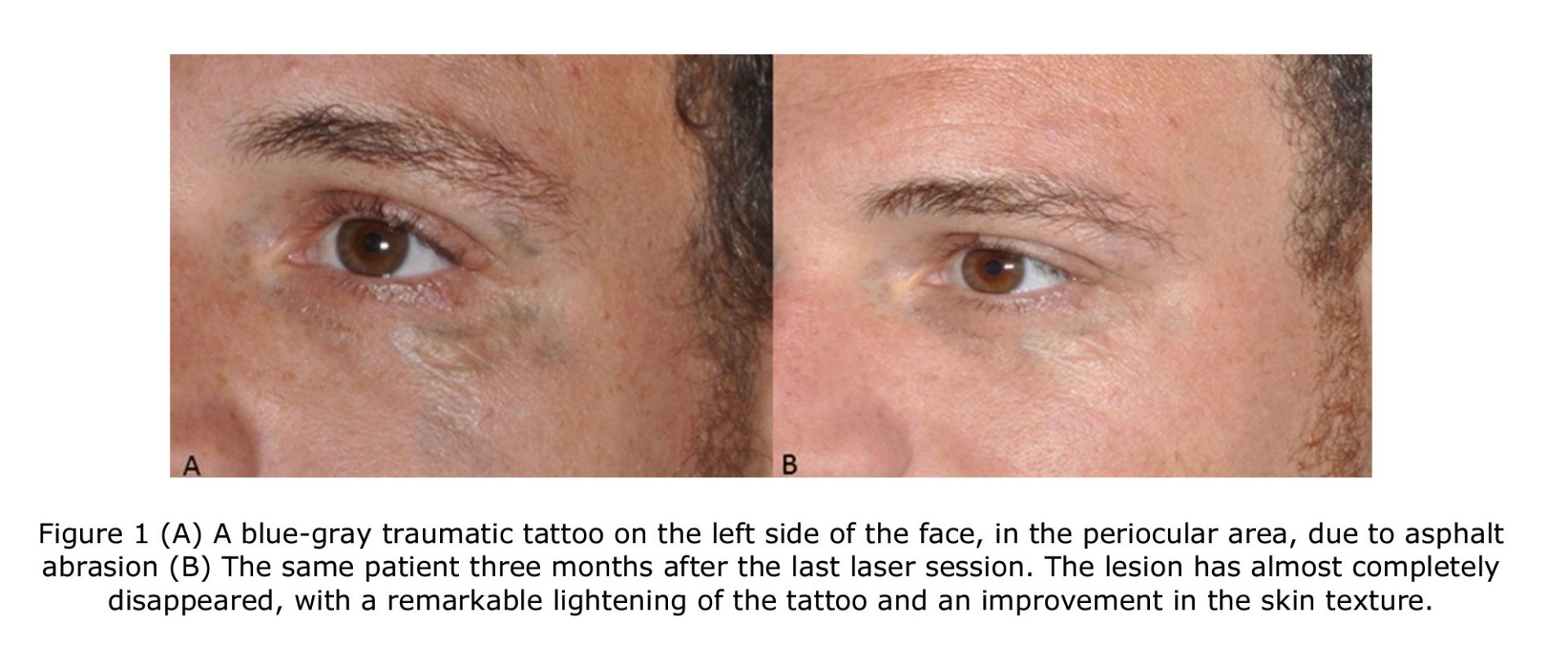
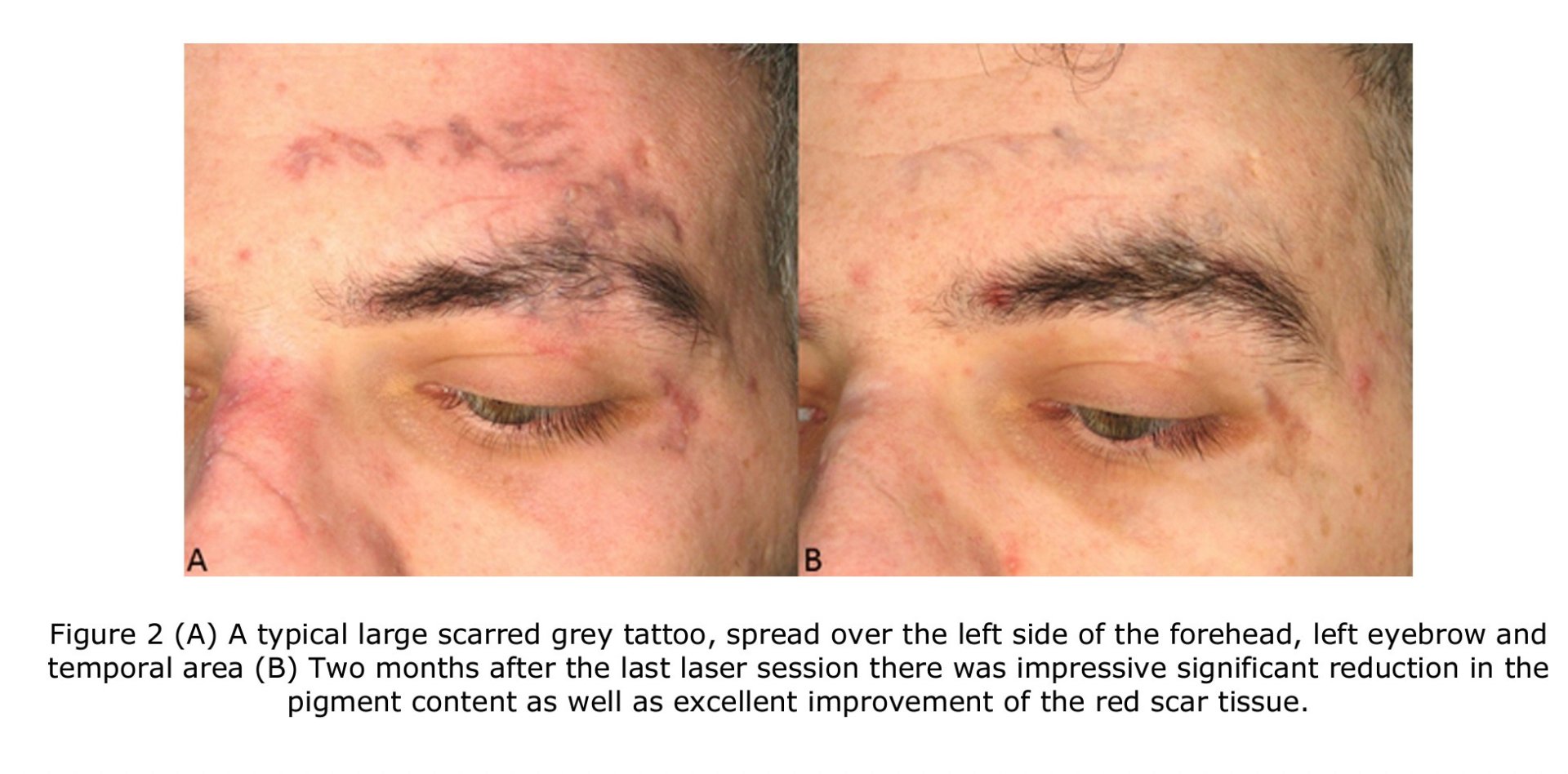
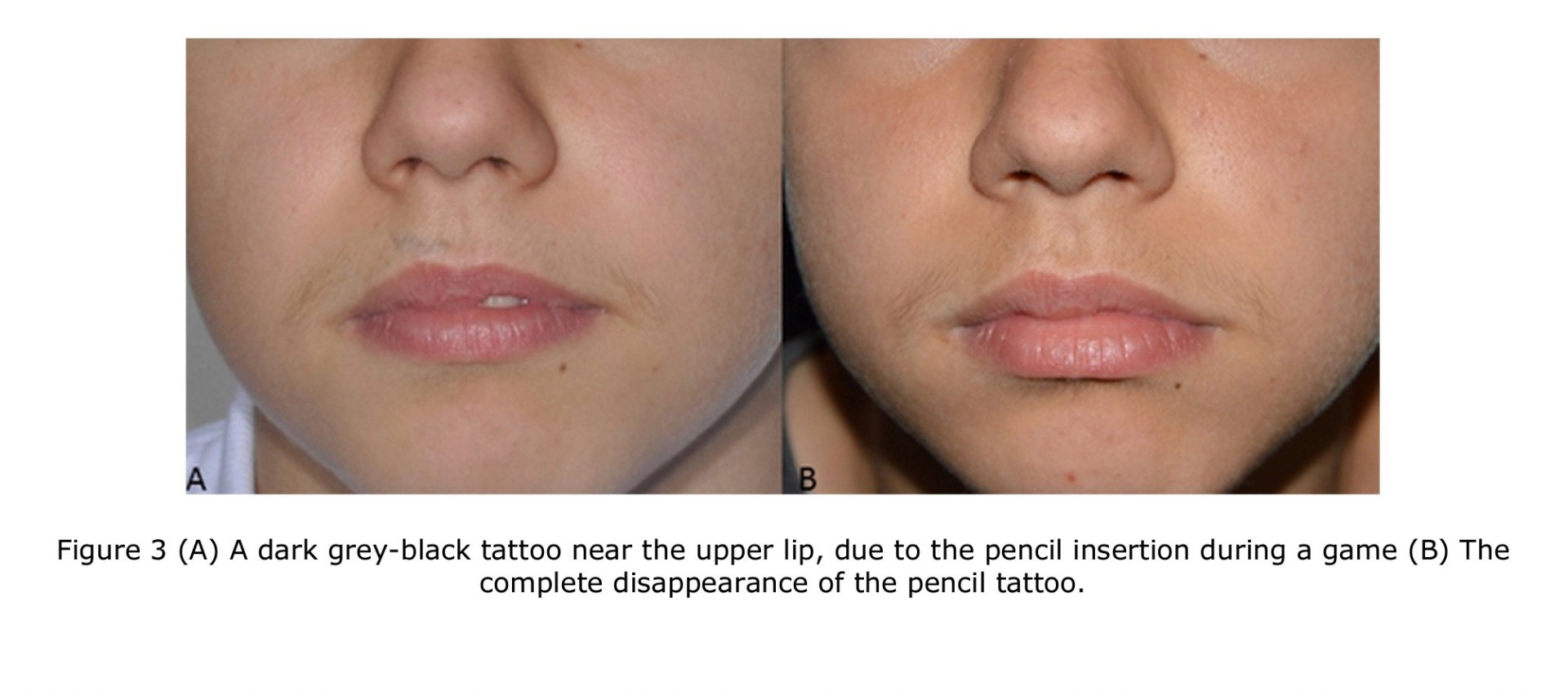
•การดูแลเบื้องต้นเมื่อเกิดบาดแผลต้องเอาวัสดุที่เป็นเม็ดสีแปลกปลอมออกทันทีก่อนที่จะสร้างเยื่อบุผิวใหม่ หากไม่ดำเนินการตามขั้นตอนนี้ อนุภาคจะยังคงอยู่ในผิวหนัง ทำให้เกิดการอักเสบได้ครับ
แนวทางการรักษารอยสักจากอุบัติเหตุเช่น
•การผ่าตัดออก surgical excision
•การกรอผิว Dermabrasion
•พ่นเย็น Cryosurgery
•ปัจจุบันการรักษาหลักคือการใช้เลเซอร์ เช่น QsNdYag Laser ซึ่งมีหลายชนิด แต่ละชนิดก็มีคุณสมบัติการจับเม็ดสีที่แตกต่างกันไป การลบรอยสักส่วนใหญ่จะต้องทำการลบไม่ต่ำกว่า 3 ครั้งจึงจะเห็นผลชัด
•Pulsed dye laser and Q-switched Nd:YAG laser*
•Erbium Yag
•Fractional CO2 Laser
•และล่าสุดมีรายงานการใช้ Picosecond Laser**
ซึ่งมีข้อดีในการปล่อยพลังงานในช่วงระยะเวลาที่สั้นทำให้เกิดปฏิกิริยาในการทำลายเม็ดสี photothermal and photomechanical (Photoacouatic effect) ได้ดีกว่า หลังจากนั้นอนุภาครอยสักจะถูกกำจัดผ่านทางระบบน้ำเหลืองและผ่านทางผิวหนังต่อไป
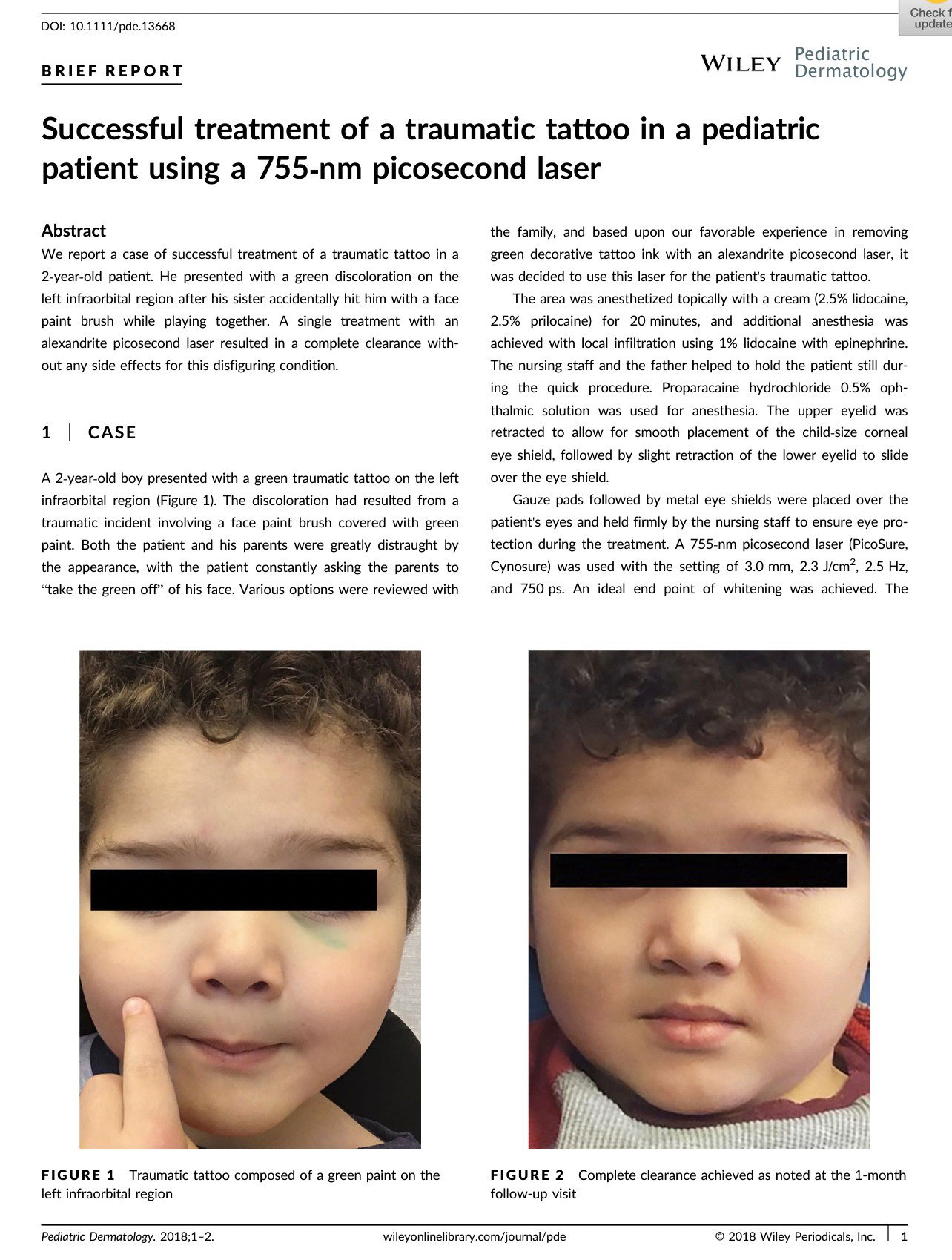
หมอมีคลิปเทคนิคดูแลรอยสักจากอุบัติเหตุ Traumatic Tattoo ด้วย Picosecond Laser มาฝากครับ
References
**Jeon H, Geronemus RG. Successful treatment of a traumatic tattoo in a pediatric patient using a 755-nm picosecond laser. Pediatr Dermatol. 2018 Nov;35(6):e430-e431.
*Bonan P, Bassi A, Bruscino N, Schincaglia E, Gavrilova M, Troiano M, Verdelli A. Combined pulsed dye laser and Q-switched Nd:YAG laser intraumatic facial tattoo removal: A case series. Dermatol Ther. 2019 Sep;32(5):e13069.
These permanent marks can be made purposely, creating words or designs. However, sometimes, traumatic occurrences leave their mark on the skin as well. These undesirable, accidental tattoos are caused by the forceful penetration of the skin from foreign bodies, such as fireworks’ particles, metals, gunpowder, asphalt, or a variety of metals. This kind of tattoo can frequently be seen on victims of bicycle, motorcycle or automobile accidents.
Traumatic tattoos can be successfully treated with the Q-switched Nd: Yag and Picosecond laser.
Traumatic Tattoo Removal Procedure
First, an anesthetic cream will be rubbed into the skin where the tattoo is to be removed. A few patients will also requite an injection of lidocaine to alleviate all painful sensations.
Once the cream has taken effect the exactly modulated laser light is passed over the tattooed skin where it microscopically shatters the pigment into tiny particles, which can then be more easily eliminated by the body.
Most patients undergo a series of 10-minute treatments to achieve the most complete tattoo removal possible.
Recovery from Tattoo Removal
A mild to moderate irritation of the overlying skin is to be expected for about a following laser treatment for tattoo removal, depending on the depth of the tattoo, the particles lodged in the skin, and amount of pigment that had to be removed.
During your recovery you will be asked to wash the area with a mild soap and gently pat dry, then apply a soothing moisturizer to the skin.
Avoid excessive sun exposure and tanning for one week after your treatment.
Patients should consider the use sunscreen and fading creams after the procedure.
Strenuous exercise and alcohol intake should be avoided. Cover-up clothing is very helpful during the healing process.
...
Cr: หมอรุจชวนคุย
...
ผลลัพธ์อาจแตกต่างกันไป แล้วแต่บุคคล
ลบรอยสักด้วยเลเซอร์ Picosecond Laser มีเทคนิค และ จุดเด่นอย่างไร ?
https://youtu.be/oDNr5MuBsxg
https://bit.ly/3ARo8gQ
https://bit.ly/3iBgLAG
https://youtu.be/eDFur6ZDmSU
https://youtu.be/iAHRyqrJ_W0
https://youtu.be/lf-VMgtbwrY
https://youtu.be/B4_g_ogParU
https://youtu.be/GPA8ts4UQgE
https://youtu.be/oDNr5MuBsxg
https://fb.watch/f3gbhh_0q0/
https://youtu.be/OYrE2zJUKNQ
....
คลิก!! จองสิทธิ์!! เพื่อรับข้อเสนอพิเศษ
(จำนวนจำกัด)
...
ปรึกษาคุณหมอหรือสอบถามเพิ่มเติมได้ที่
Tel : 063-959-4392 / 063-896-2514
Line: http://line.me/ti/p/@Demedclinic
Line: @Demedclinic
Wechat/Whatsapp: Demedclinic
IG: https://www.instagram.com/drsuparuj
www.facebook.com/drsuparuj
Youtube: https://bit.ly/3p20YLE
Blockdit: https://bit.ly/3d8vYr1
https://vt.tiktok.com/ZSJ141Mdf/
https://mobile.twitter.com/drruj1
www.demedclinic.com / www.demedhaircenter.com